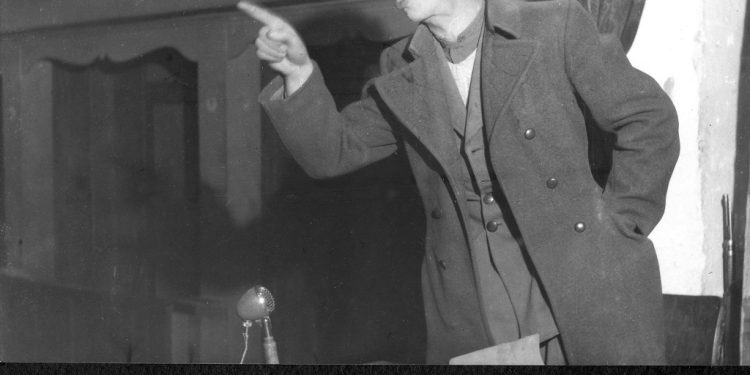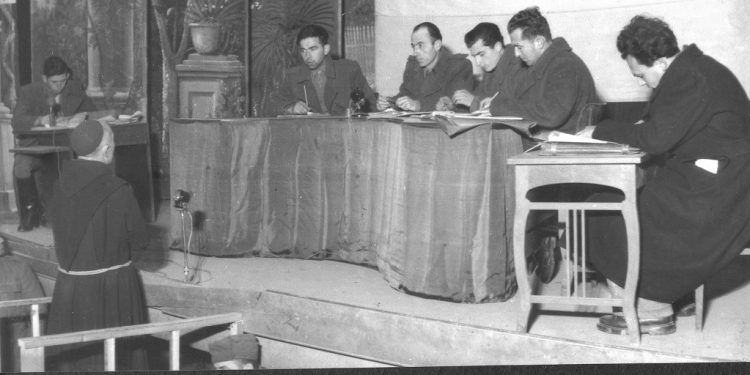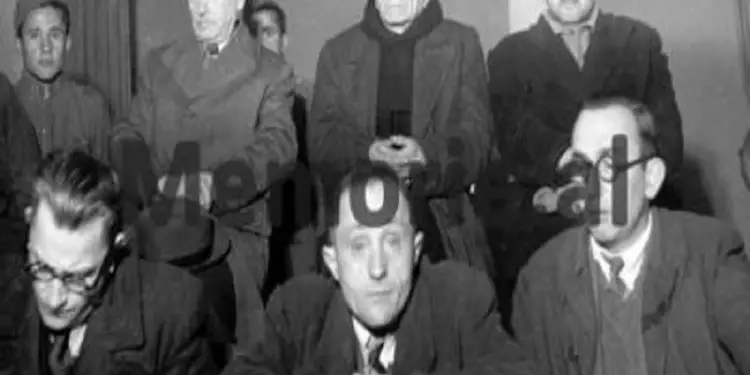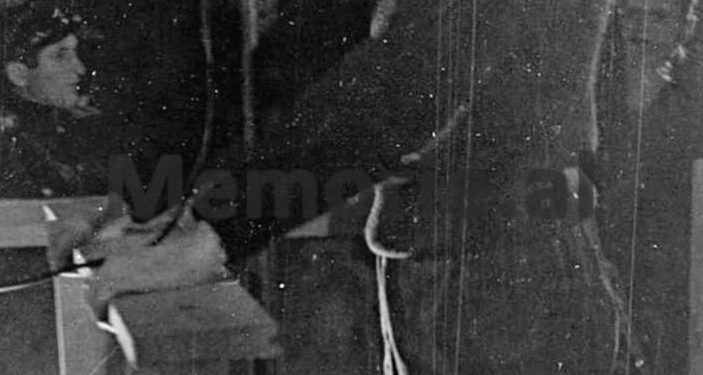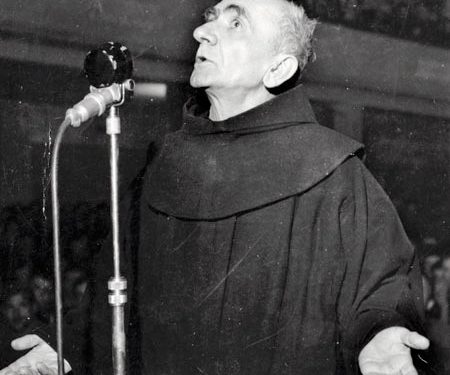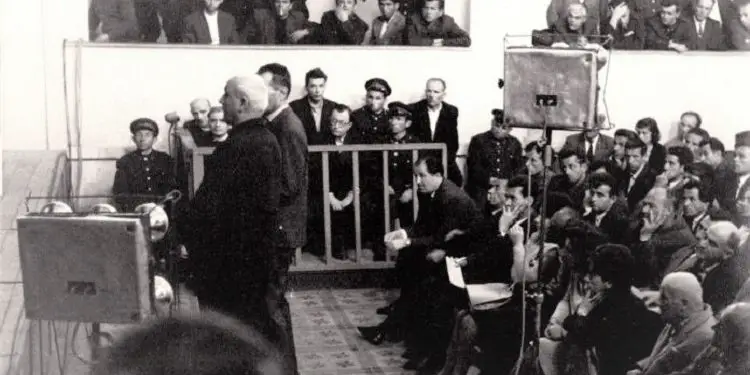From Veli Haklaj
PERSECUTION OF THE CATHOLIC CLERGY – STATE SECURITY QUESTIONS IN 1946
Second part
Memorie.al / In the history of the Albanian nation, the Catholic Church has played an important and often precious role. Unfortunately, the relationship that the communist government built in Albania, with the faith as a whole, resulted in an unprecedented wave of repression against clerics of all faiths in our country, especially against the spiritual leaders of the Catholic faithful. According to the determination made by Monsignor Rrok Mirdita: “Regardless of the gigantic strength with which the church has carried the weight of the national culture, regardless of the unbearable light it has cast on the shadows of our old and new history, regardless of the spirit of sacrifice that has accompanied her life in our country, even for these very reasons, many attacks have been launched against the Catholic Church in Albania, and one of the most terrible was the communist one, which together with the process of physical disappearance of the most vocal Catholics, staged the process of distortion of history, on the relations of the Catholic Church with Albania”.
QUESTION FROM DOM MARK HASI
Following the investigation process, regarding the problems asserted by Father Mark Harapi, the first captain Nesti Kopali questioned Dom Mark Hasin, who testified:
– That morning when the Postriba event took place, returning from church, I found Father Mark Harapin in his cell drinking coffee and I asked him: – How did this sound? He answered me: – Shkodra, etc., who betrayed Postriba, have a black face. Then I add Father Mark Harapi: – I have known for two days that it would be done. Regarding what Dom Mark Hasi declared, Father Mark Harapi would testify:
– I don’t remember if I met Dom Mark Hasi in the morning of the event, while as far as he declares, that I allegedly said it; “I’ve had it for days”, “I patch my black cheek”, etc., this is not true.
Minutes of the questioning of Father AGOSTIN ASHIKU
On November 28, 1947, in the Office of the State Security Section in Shkodër, in front of the security investigator Pjerin Kçiras, Father Agostin Ashiku, son of Zefi and Çis, 42 years old, from Shkodra, low class citizen, was questioned. unmarried, not previously convicted, priest of the Franciscan order of Shkodra, who declared:
In 1942, I entered the first Jesuit school, where I also did the second. I completed the last three at Franciscan primary school. In the first grade of gymnasium, which I started at Liceu e Fretënve, I was enrolled in Xakua and from that time I continued in this order, until 1948, when I left gymnasium.
In 1928, I was sent by the Franciscan Assembly to Italy to study craftsmanship in Milan and, later, in Sargeno (Arleo). In 1932, I returned to Albania as a priest. At the end of this year, I went to Italy again, where I enrolled in the Franciscan Assembly of Florence, studying classical literature. I stayed here until 1936 and returned to Albania again, as a professor at the French Gymnasium.
I did not expect the arrival of fascism in Albania, because I considered it as an occupation. I don’t know if the Franciscan Assembly was ever subsidized by Fascist Italy. But I know that we had support, in every way, food, etc.
In 1940, I was appointed director of the “Antonian” Society. At this time, I managed to gather the Catholic youth, since they had been destroyed since the departure of Father Lek Luli. At first, I gathered some 45 people, among whom were; Injac Toni, Luigj Toni, Lec Fishta, etc. We developed religious activities as well as entertainment for Antonian youth. I do not know that any political activities have been carried out by members of the Antonian youth.
I only know that, two months after I handed over my position, as director of the “Antoniane” Society, Father Gjon Shllaku expelled all the members of the society, because the “Balli Kombëtar” organization was born there, with Injac Toni, Luigj Toni , Lec Fishten, Ndue Shllaku and others like these, which were later published in the “Balli” circular for the youth.
Father Gjoni was anti-fascist and in fact he, with the organization of the “Antoniane” Society, once again gathered those young people who were with “Balli”, and now they are very well known as… Gjeka, Lec Fishta, etc. I know that later, Father Gjoni also gathered the young people of the “Rozafat” Society and united all the elements not in their youth. It is true that Luigj Mjeda was at the head of these.
The main purpose for the gathering of youth and meetings in the “Antonian” Society, or even in other societies, is to not participate in politics, but rather to consider the religious needs and duties that belong to a secular. It is true that in this way, damage and loss has been brought to the National Liberation War, due to the non-participation of a series of Catholic citizens in the popular revolution.
On the other hand, the agitation of the Clergy in general was in favor of the cause of the liberation of Albania and a partiality that many citizens of Shkodra held in this work. From these religious societies, the elements for the organizations of “Balli” and especially from that of “Catholic Action” emerged.
I was also the director of the “Frančeskan” Gymnasium from the middle of 1941, until June 1944. It is true that for the student youth of the “Frančeskan” Gymnasium, we ordered some moral education texts, where we taught them the education fascist, based on the text. I actually sabotaged it because I didn’t like it.
The youth was educated in other classes by Father Gjon Shllaku with the fascist spirit. The reason was that we were financed by Fascist Italy. I know that they paid us two thousand five hundred gold francs for one year. I have also formed a society called “Enkeristic”, whose members could be from 8 to 12 years old, with only a religious purpose.
From 1944, until the day I was arrested, I was a close adviser of the Franciscan Assembly. The Council was tasked with the external and internal needs of the Assembly, the economy, etc. As a councillor, I had no knowledge about the weapons hidden in the Assembly, but when they were found, I saw them and I was surprised.
It is not true that I had a relationship with Gjovalin Zeza and other members of the “Albanian Union”. I have not met them and I have no knowledge of such an organization.
FATHER FRANO KIRI AND FATHER ČIRIL CANI ARE QUESTIONED
Minutes of Father Frano Kiri’s questioning
On November 30, 1947, in the office of the State Security section, in Shkodër, by the officer of this section, aspirant Ali Xhunga, the defendant Father Frano Kiri, son of the deceased Tom and Gjyste, 47 years old, was interrogated. born in the “Rus” neighborhood and a resident of the “Frančeskan” Assembly (Arra e Madhe), Shkodër, with Albanian nationality and citizenship, unmarried, never convicted, who stated the following:
In 1912, I finished five classes of primary school, in 1920, I finished the “Frančeskan” Gymnasium Shkodër, in 1924, I also finished high school, for Mythology and Philosophy in Rome and I returned to Albania, with the duty of a priest, where I served as a mathematics professor at the “Frančeskan” High School until 1941. During the year 1938, until 1941, I was also a professor at the Sigmatin Normal School. From 1941 to 1944, I was a parish priest in Kir.
In 1945, I was sick in Tirana, without duty. From 1945, until the day of my arrest (December 14, 1946), I stayed in the “Frančeskan” Assembly of Arra e Madhe, in Shkodër, without duty. When I was a student at the “Frančeskan” Gymnasium, I had Professor Father Ambros Marlaskaj, who in the lessons, instilled in us the love for Germany and the English, which sympathy existed until the end.
When I returned from Italy, I found Father Marlaskaj the principal of the gymnasium, and here I also talked to him, from when I was a student, who used to talk to me about the Germans, presenting them as a noble people in spirit, thought, etc. So I developed a love for them. I tried to instill this sympathy for the Germans among the students when I was a professor.
I have been involved in politics since 1924, where I sympathized with the opposition, for which I also worked, making friends to vote in its favor, in agreement with Luigj Gurakuqi, Bajram Curri, etc. After the opposition lost and Zogu won, the Clergy was generally against him, especially when Zogu closed the schools, which were closed for three years (1933 – 1936). After a request was made to the League of Nations, which intervened with the government, the schools opened again, although a part of the Clergy stood against the Bird.
The Catholic clergy, before 1918, sympathized with the Austro-Hungarians, after that they were financially dependent and took direction from there, politically, etc. After 1918, they sympathized with Italy, because they studied here, we were given financial aid and many other things, which was done with the sole political purpose, to stop its sympathy in Albania, as it is now. that the greater part of the Clergy sympathize and help them in their actions in Albania.
My action begins in 1933, at which time, with the closing of the schools, I founded the “Antoniane” Society, by order of the Archbishop of Shkodra, Monsignor Mjeda, which was formed with the sole purpose of giving to the youth a religious education. At this time, if I’m not mistaken, the “Don Bosco” Society was also formed with the initiative of Father Pjetër Meshkalla. Both of these societies have the goal of raising the youth with a religious education, to be closer to the Clergy and to use them for his needs.
I remember that in 1936, by order of the Pope, the “Catholic Action” was formed through the apostolic delegate and this, in agreement with Archbishop Thaçi, forms the action in all of Albania. From the very beginning, the Sorrowful Lady Circle (girls) and the “Catholic Action” Circle (boys), etc., were established.
At this time, Archbishop Thaçi held a meeting where he called all the leaders of different societies, such as; Dom Mikelin, Bumçin, Vincens Prendushin, the Pope’s delegate, Nigris, etc. After this meeting, all societies entered the “Catholic Action”, according to the order of the Pope, only they did not merge into it, but stood as a society and worked as per a directive of the “Catholic Action”.
I know that Dom Mikel Koliqi, was the director of “Catholic Action”, for the region of Shkodra and, like every Bishop in Albania, had someone in charge as director of “Catholic Action”, such as; Durrësi, Lezha, Dukagjini, Mirdita, Zadrima, but I don’t know their names, who was the director. For all this, it was Archbishop Thaçi, on whom everyone depended. The leaders of the societies held various meetings, where they talked about the progress of the “Catholic Action”, received instructions to fight communism and reported every flaw.
“Catholic Action”, the external image was presented by a religious society, but in reality it was a political organization, which was formed with the sole purpose of fighting communism in Albania, as well as any current that was contrary to the Catholic doctrine. then it was aimed at gathering all the Catholics, to bring their delegates to the parliament, to demand their (Catholic) rights, from any regime that would come to Albania.
The clergy has sympathized with fascism since before, where in one way or another, they aroused this sympathy in the people as well, thus indirectly preparing the ground for the arrival of fascism. This was mostly due to the “Catholic Action” that was doing a job in this direction, so the Italian government has helped us with money, such as; financial aid for clerical schools, Italian professors, books that were withdrawn by the consulate, etc., which have influenced our country.
Father Gjergj Fishta (deceased), Father Pal Doda (prison), Father Bernardin Palaj, Father Çiprian Nika, Father Anton Harapi, etc., had a relationship with the Italian consulate, but what kind of relationship and how they maintained these, I do not know let me explain The “Catholic Action” gained its greatest momentum in 1937 and 1938, where at that time all the people accepted to participate without exception, because at this time, other societies were also established, such as “Zonja e Dimbshme” etc. ., which depended on “Catholic Action”.
I awaited the arrival of fascism in Albania with regret, because even before I did not sympathize with it, like other clerical friends. After the advent of fascism, Kleri had an even closer friendship, for which he helped with the press, where they raised fascism to the sky and brought down communism.
With the emergence of the National Liberation Movement, the Catholic Clergy has maintained a hostile attitude against it and has tried in every way to stop its spread, as it was known that the Communist Party was a part of it, which it had fought since before. for the reason that they called it anti-faith and contrary to Catholic doctrine. At this time, I was a parish priest in Kir, Dukagjin, which (the National Liberation War) I fought as an infidel, etc., but as a fighter against foreigners, I admired them.
With the appearance on the scene of the “National Front”, Legality, National Independents, the Catholic Clergy has supplied and worked with them, such as; Dom Zef Shestani with the “National Front”, Padë Lek Luli with Legality, and many others who have gone public. At this time, “Catholic Action” has worked even more and many of its members have participated in the top three parties, fighting even better the National-Liberation War, by participating in these parties.
In 1941, I participated in the meeting of Ipeshka, where they participated; apostolic delegate Nigris, Monsignor Thaçi, Monsignor Volaj, Dom Mikeli, two Italian Jesuits, Dom Tom Laca, and some others that I don’t remember. Here the question of the presidents of the various societies that participated in the “Catholic Action” was raised, which society belongs to the parish in a religious function. I know that fascism, from the first days it came to Albania, gave large sums of money to the Catholic clergy, which it gave through the delegate Nigris. After receiving this money, the bishop distributed it to the parishioners.
Even before it came to Albania, fascism gave financial aid to the clergy, except for those that were annual. This money was given by the consulate to some priests for churches such as Father Bernardin Palajt, Father Gjergj Fishtė, etc. Fascism, since before the arrival, had opened hospitals, industrial schools, instructors, etc., which were erected in the Open by the Catholic Action; that’s why they made sure that fascism in our region was not fought, both with its arrival and later when it was fought in all of Albania, because it was largely thought to coordinate that they were Catholics, not thinking that it was an occupation .
In the spring of 1943, Pjetër Daragjati came to Dukagjin, who gathered the bajraktars of Shala and Shoshi to gather volunteers in those bajrakas. He registered a number of three to four hundred people, they were also assigned salaries, weapons, etc., and distributed them in their homes and when the need was seen, with the help of their leaders, they were to gather immediately. At this time, Pjeter Daragjati did not talk to them about any party, except that he told them that we should organize for the peace of the country and never against communism. At this time, the Bajraktars decided that in all of Dukagjin, no party should be allowed to enter, so as not to get into a fight between each other.
In September 1943, I sat in Shkodër and here I met Father Anton Harapin, who told me that you should be interested in the Bajraktars so that the way for the ballistas in Dukagjin is opened. So when I came back I got along with them, but at this time Sulço Beg’s son also came to Cukal with some ballistas, who talked with Lulash Gjeloshin himself. After the conversation, Sulço’s son came back, and after a while Dukagjini started to write ballista in Shkodër. So the decision that Dukagjini had made not to approach [forces] was broken, with the exception of the parties that he continues to not approach until the end, which came with a war.
In July 1944, I was in Tirana and two people from Dukagjin, Vat Gjoni and Mark Sadiku, came here, who begged me to get them ammunition from the Germans. Then I got along with Father Anton Harapin, who gave me a letter for the German command to withdraw twenty boxes of cartridges, nine of which Lik Marashi would take and one I took which I distributed to the villagers of Kiri .
I have worked against the National Liberation Movement as an individual, but I have never done organized work and it is not true that I was sent to Dukagjin on a mission by the Clergy, to organize the people against the National Liberation Movement. I welcomed the liberation of Albania nationally, but as a regime I welcomed it badly, because it was known that there was a communist party inside. Memorie.al
The next issue follows




